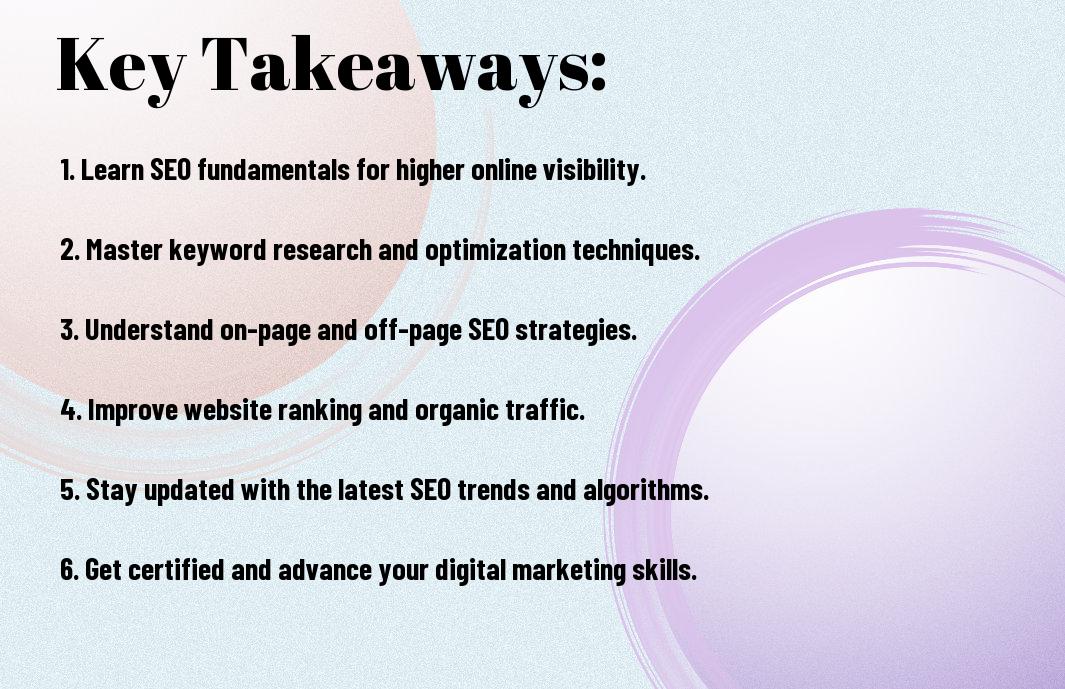Online visibility is crucial for any business looking to succeed in the digital landscape. Our top-rated SEO course is designed to help you climb the search engine rankings, drive more organic traffic to your website, and ultimately increase your online visibility. In this blog post, we will look into the importance of SEO in today’s competitive online market and how our course can provide you with the knowledge and tools needed to stay ahead of the game. Let’s explore how you can boost your online presence and reach your target audience effectively with our expert guidance.
Key Takeaways:
- SEO Course: Our course focuses on top-rated strategies to boost online visibility.
- Keyword Research: Learn how to effectively conduct keyword research to drive traffic to your website.
- Content Optimization: Understand the importance of optimizing website content for search engines.
- Link Building: Explore link building techniques that help improve your website’s authority and search rankings.
- Analytical Tools: Gain insights on how to use analytical tools to track and measure the success of your SEO efforts.

Understanding SEO Fundamentals
How Search Engines Work
Fundamentals, search engines work by crawling, indexing, and ranking web pages based on relevance to a user’s search query. Crawling involves automated bots following links to discover content, indexing stores and organizes this content in databases, and ranking determines the order in which pages appear in search results.
Key SEO Concepts and Terminology
Work, understanding key concepts like keywords, backlinks, and metadata is vital for effective SEO. Keywords are the terms users enter into search engines, backlinks are links from other websites that signal credibility, and metadata includes title tags and meta descriptions that summarize page content.
Terminology, furthermore, concepts like on-page SEO, which involves optimizing content and HTML source code on a webpage, and off-page SEO, which focuses on external factors like backlinks, are vital for a comprehensive SEO strategy.
On-Page Optimization Techniques
Keyword Research and Optimization
All successful SEO strategies start with thorough keyword research. For effective keyword optimization, you need to understand your target audience’s search behavior and intent. Use keyword research tools to identify high-volume, relevant keywords for your content. Incorporate these keywords strategically in your titles, headings, meta descriptions, and body content to improve your website’s visibility in search engine results.
Content Creation and Strategy
One crucial aspect of on-page optimization is creating high-quality, engaging content that resonates with your target audience. Develop a content strategy that focuses on providing valuable information, solving problems, and answering questions for your readers. Ensure your content is well-structured with clear headings, relevant images, and links to authoritative sources to enhance credibility and engage users.
Research shows that websites with consistently updated and informative content tend to rank higher in search engine results. Regularly publish fresh content that addresses the latest trends, news, and developments in your industry to keep your audience engaged and attract new visitors to your site.

Off-Page Optimization Strategies
Building Quality Backlinks
One of the most crucial off-page optimization strategies is building quality backlinks to your website. Backlinks are links from other websites back to your site, and search engines view them as a vote of confidence in your content. Focus on getting backlinks from high-authority websites in your industry to improve your website’s credibility and ranking in search engine results.
Social Media and SEO
One key off-page optimization strategy is leveraging social media to boost your SEO efforts. Social media platforms provide an excellent opportunity to promote your content and engage with your audience. By sharing your content on social media channels, you can drive traffic to your website and increase your online visibility. Additionally, social signals from platforms like Facebook, Twitter, and LinkedIn can impact your search engine rankings.
For instance, when your content is shared and liked on social media, it signals to search engines that your website is valuable and relevant to users. This can positively impact your SEO efforts and help improve your website’s ranking in search engine results. Be sure to create shareable content and actively engage with your audience on social media to strengthen your online presence and improve your SEO performance.
Technical SEO
Website Performance and Mobile Optimization
For a successful SEO strategy, it’s crucial to prioritize website performance and mobile optimization. Google considers page speed and mobile-friendliness when ranking websites. By optimizing your website for faster loading times and ensuring it is responsive on mobile devices, you can improve user experience and boost your search engine rankings.
Structured Data and Schema Markup
Any effective SEO strategy should include structured data and schema markup to provide search engines with more information about your website’s content. By implementing structured data markup, you can enhance how your website appears in search results with rich snippets, making it more appealing to users and increasing click-through rates.
Structured data and schema markup help search engines understand the context of your content, leading to better visibility in search results. It enables your website to stand out from competitors and increases the likelihood of attracting organic traffic.
Mobile Usability
Mobile usability is an necessary aspect of technical SEO as Google prioritizes mobile-friendly websites in its search results. Ensure your website is responsive and provides a seamless experience on mobile devices to improve your online visibility and user engagement.
Measuring SEO Success
Your online visibility is crucial for the success of your business in today’s digital age. Implementing effective SEO strategies is key to ensuring that your website ranks high on search engine results pages. However, how do you know if your SEO efforts are paying off? Measuring SEO success is important to track the impact of your strategies and make informed decisions moving forward.
One of the most common ways to measure SEO success is through monitoring your website’s search engine rankings. Tools like Google Analytics and SEMrush can provide valuable insights into where your website stands in search results for relevant keywords. By tracking your rankings over time, you can assess the effectiveness of your SEO efforts and make adjustments as needed.
Another important metric to consider when measuring SEO success is organic traffic. By analyzing the amount and quality of traffic coming to your website from organic search results, you can gauge the impact of your SEO strategies on driving visitors to your site. Monitoring changes in organic traffic can help you determine which tactics are most effective in attracting your target audience.
Conversion rates are also crucial when measuring SEO success. Ultimately, the goal of SEO is not just to drive traffic to your website but to convert that traffic into leads or customers. By tracking conversion rates for different landing pages or campaigns, you can identify which areas of your website are performing well and which need improvement.
Overall, measuring SEO success is important for optimizing your online visibility and ensuring that your efforts are driving real results for your business. By monitoring key metrics such as search engine rankings, organic traffic, and conversion rates, you can make data-driven decisions to continuously improve your SEO strategies and increase your online presence.
FAQ
Q: Why is it important to boost online visibility?
A: Boosting online visibility is crucial because it helps your website rank higher in search engine results, increasing organic traffic and potential customers.
Q: How can SEO courses improve online visibility?
A: SEO courses provide in-depth knowledge on optimizing websites for search engines, helping you implement effective strategies to enhance visibility online.
Q: What does the top-rated SEO course cover?
A: The top-rated SEO course covers keyword research, on-page optimization, link building, technical SEO, and analytics to improve online visibility.
Q: How long does it take to see results from SEO efforts?
A: SEO is a long-term strategy, and it may take a few months to see significant results. Consistent implementation of SEO tactics is key to success.
Q: Is SEO course worth the investment for my online business?
A: Yes, investing in an SEO course is worthwhile as it equips you with the knowledge and skills needed to boost your online visibility, leading to increased traffic and conversions.
